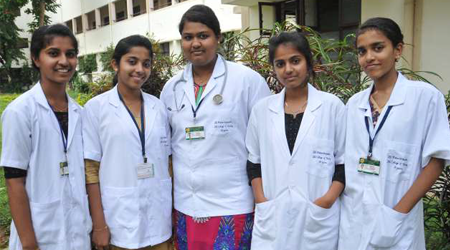
JSS College of Nursing
Various health surveys brought to light the fact that the strength of nursing staff in all the fields of health needs to be increased appreciably. The high power committee on ‘Nursing and Nursing Profession’ set up by the Central Government gave its recommendations at the end of March 1990. One of the recommendations was that nursing education needs to be fitted into the national stream of education to bring about uniformity, recognition and standards.
The committee recommends that there should be two levels of Nursing Personnel viz., Professional Nurse (Degree level) and Auxiliary Nurse/Vocational Nurse (Plus two level). This is the internationally accepted pattern of nursing education.
The JSS College of Nursing was started in November 1997 by the foresight and vision of His Holiness Jagadguru Sri Shivarathreeshwara Deshikendra Mahaswamiji to prepare professional Nurses at the university level in order to improve standards of nursing service through quality nursing education.
The idea was conceived in 1990 and nurtured for seven long years. This is the first college of nursing started in the city of Mysore as well as the first college of nursing in Mysore to start a post-graduation course in nursing. Its motto is to maintain the standards of nursing education and all efforts are made to deploy well qualified and experienced faculty to achieve the goal.

As a nurse, you get more than a rewarding career.
The satisfaction of rendering a noble service to humanity.
Nursing according to the International Council of Nurses
Nursing encompasses autonomous and collaborative care of individuals of all ages, families, groups and communities, sick or well and in all settings. Nursing includes the promotion of health, prevention of illness, and the care of ill, disabled and dying people. Advocacy, promotion of safe environment, research, participation in health policy and in patient and health systems management, and education are also key nursing roles.
- To promote quality nursing services through quality
nursing education. - To develop nursing professionals who are self-reliant and compassionate.
- To transform our college into a centre of excellence in nursing education & research conforming to national and international standards.
- To groom students to become citizens of integrity.
Students are expected to adhere to the disciplinary code of the college.
- Loitering without reason
- Creating disturbance in college activities
- Use of cell phones in classrooms, labs, corridors, library, college, office and clinical facilities
- Ragging & eve-teasing
- Smoking or using alcoholic beverages inside the campus
- Entertaining outsiders in the campus
Philosophy
The JSS College of Nursing, an off-shoot of JSS Mahavidyapeetha, Mysore, is affiliated to Rajiv Gandhi University of Health Sciences, Bangalore, and recognized by Indian Nursing Council. It subscribes to the philosophy of providing professional education at the university level. The faculty supports the principles that the purpose of education is harmonious and all-round development of individuals, which is brought about by meaningful experiences coordinated from classroom to the clinical field level, within a climate of mutual respect and understanding.
The faculty views nursing as a profession, which contributes to the health services in a vital and significant way. It recognizes national health goals and is committed to participating in the implementation of National Health Policies and Programmes. It believes in identifying the health needs of the people, planning and providing quality healthcare in collaboration with other health professionals and community groups. The scope of nursing includes the prevention of diseases, promotion of health in individuals, families and community and the care of the sick, injured and infirm in the hospital and/or community. We also view that the concept of comprehensive nursing includes care during wellness, illness and rehabilitation; guiding and teaching the patient and family regarding continued care, recovery and maintenance of health.
The faculty believes that nursing education is based on an understanding of man, derived from the knowledge of humanities, psychological, social, biological and physical sciences. Nursing is based on values of caring and aims to help individuals to attain independence in self-care. It necessitates the development of compassion and understanding of human behaviour among practitioners to provide care with respect, dignity and protect the rights of individuals and groups.
The faculty accepts the fact that undergraduate nursing programme is broad-based education within an academic framework specifically directed to the development of critical thinking skills, competencies & standards required for the practice of professional nursing and midwifery as envisaged in the National Health Policy 2002. The faculty also accepts and appreciates that the teachers have the responsibility to be role models and create a learning environment that enables students to acquire inquisitiveness driven, self-directed learning and fosters an attitude of lifelong learning. The faculty is also responsible for preparing better-qualified nurses to assume the responsibilities of providing holistic patient care at various levels in different healthcare settings. The teachers must also be prepared to improve their knowledge and skills through channels of higher education.
The undergraduate nursing education program will also prepare its graduates to become exemplary citizens by adhering to a code of ethics and professional conduct at all times in fulfilling personal, social and professional obligations, so as to respond to national aspirations.
The faculty further believes that the Master of Nursing Programme built upon a recognized Bachelor’s Curriculum in Nursing (recognized by Indian Nursing Council), prepares nurses for leadership position in nursing and health fields, who can function as specialist nurse practitioners, consultants, educationists, administrators and investigators in a wide variety of professional settings in meeting the national priorities and the changing needs of the society. The programme prepares nursing graduates who are professionally equipped, creative, self-directed and socially motivated to effectively deal with day-to-day problems within the existing constraints and this will act as an agent of social change. Further, the programme encourages accountability and commitment to lifelong learning, which fosters the improvement of quality care.
